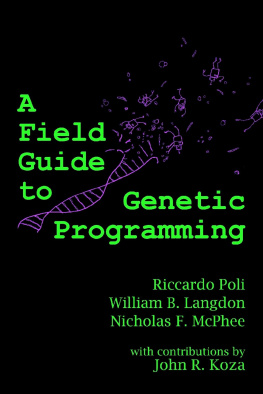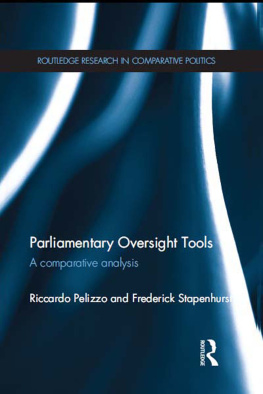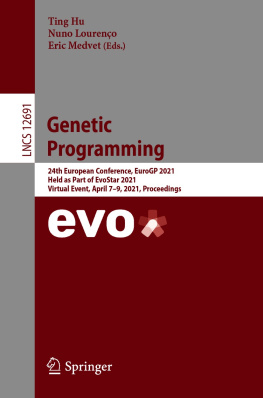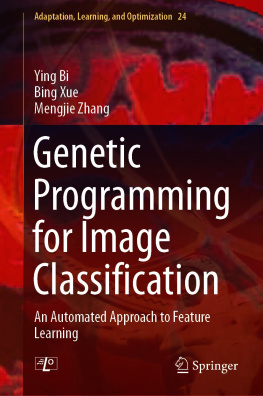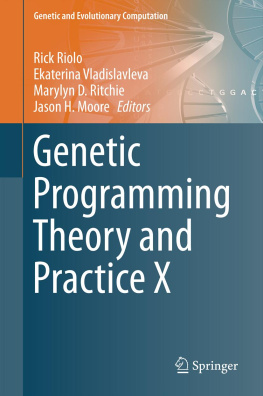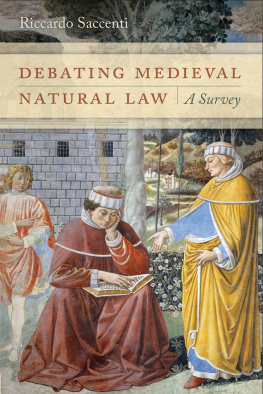Riccardo Poli - A Field Guide to Genetic Programming
Here you can read online Riccardo Poli - A Field Guide to Genetic Programming full text of the book (entire story) in english for free. Download pdf and epub, get meaning, cover and reviews about this ebook. year: 2011, publisher: Lulu.com, genre: Romance novel. Description of the work, (preface) as well as reviews are available. Best literature library LitArk.com created for fans of good reading and offers a wide selection of genres:
Romance novel
Science fiction
Adventure
Detective
Science
History
Home and family
Prose
Art
Politics
Computer
Non-fiction
Religion
Business
Children
Humor
Choose a favorite category and find really read worthwhile books. Enjoy immersion in the world of imagination, feel the emotions of the characters or learn something new for yourself, make an fascinating discovery.
- Book:A Field Guide to Genetic Programming
- Author:
- Publisher:Lulu.com
- Genre:
- Year:2011
- Rating:3 / 5
- Favourites:Add to favourites
- Your mark:
- 60
- 1
- 2
- 3
- 4
- 5
A Field Guide to Genetic Programming: summary, description and annotation
We offer to read an annotation, description, summary or preface (depends on what the author of the book "A Field Guide to Genetic Programming" wrote himself). If you haven't found the necessary information about the book — write in the comments, we will try to find it.
A Field Guide to Genetic Programming — read online for free the complete book (whole text) full work
Below is the text of the book, divided by pages. System saving the place of the last page read, allows you to conveniently read the book "A Field Guide to Genetic Programming" online for free, without having to search again every time where you left off. Put a bookmark, and you can go to the page where you finished reading at any time.
Font size:
Interval:
Bookmark:
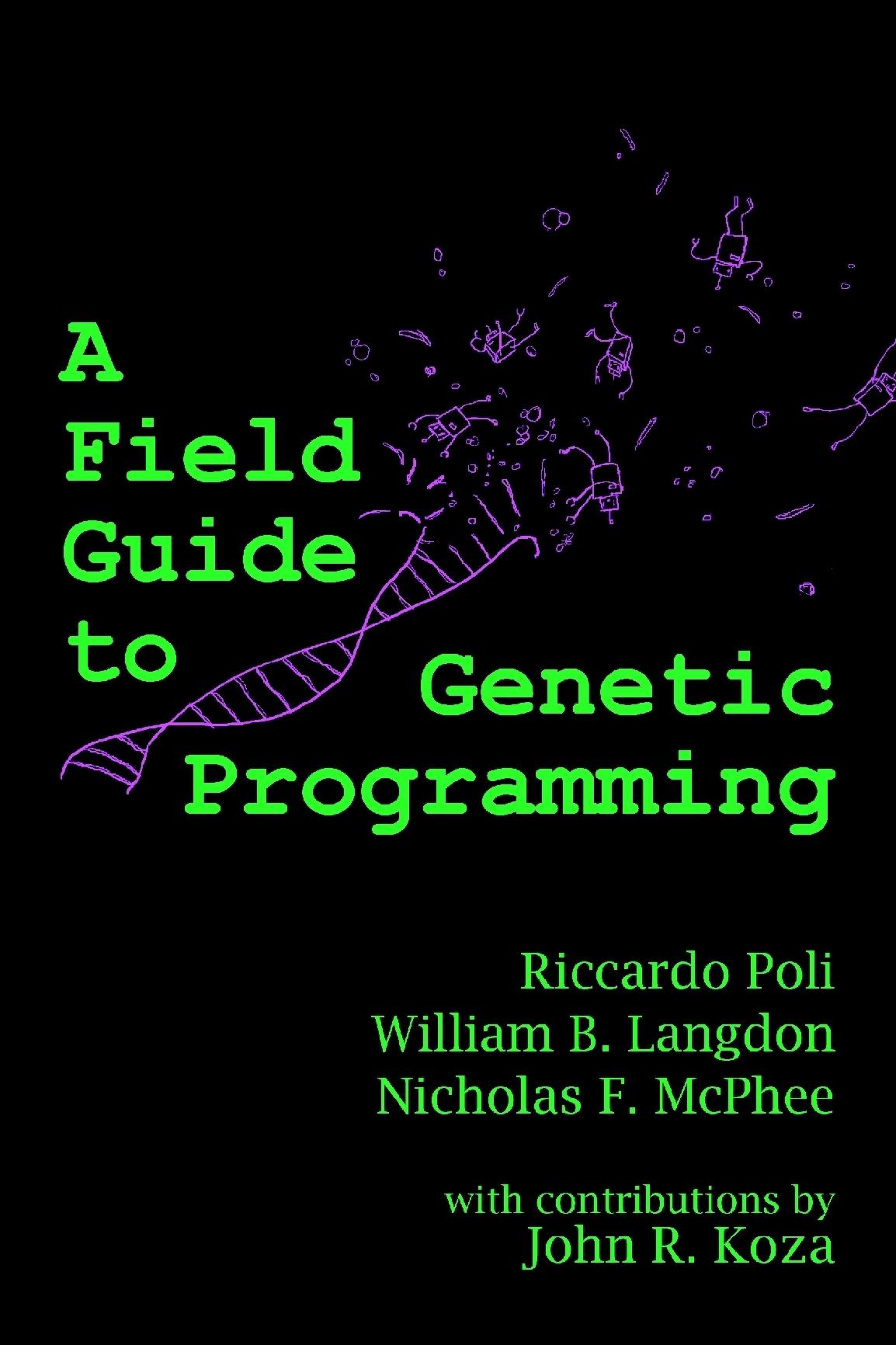
We would like to thank the University of Essex and the University of Minnesota, Morris, for their support.
Many thanks to Tyler Hutchison for the use of his cool drawing on the cover (and elsewhere!), and for finding those scary pinks and greens.
We had the invaluable assistance of many people, and we are very grateful for their individual and collective efforts, often on very short timelines. Rick Riolo, Matthew Walker, Christian Gagne, Bob McKay, Giovanni Pazienza, and Lee Spector all provided useful suggestions based on an early technical report version. Yossi Borenstein, Caterina Cinel, Ellery Crane, Cecilia Di Chio, Stephen Dignum, Edgar Galvn-Lpez, Keisha Harriott, David Hunter, Lonny Johnson, Ahmed Kattan, Robert Keller, Andy Korth, Yevgeniya Kovalchuk, Simon Lucas, Wayne Manselle, Alberto Moraglio, Oliver Oechsle, Francisco Sepulveda, Elias Tawil, Edward Tsang, William Tozier and Christian Wagner all contributed to the final proofreading festival. Their sharp eyes and hard work did much to make the book better; any remaining errors or omissions are obviously the sole responsibility of the authors.
We would also like to thank Prof. Xin Yao and the School of Computer Science of The University of Birmingham and Prof. Bernard Buxton of University College, London, for continuing support, particularly of the genetic programming bibliography. We also thank Schloss Dagstuhl, where some of the integration of this book took place.
Most of the tools used in the construction of this book are open source, and we are very grateful to all the developers whose efforts have gone into building those tools over the years.
As mentioned above, this book started life as a chapter. This was for a forthcoming handbook on computational intelligence edited by John Fulcher and Lakhmi C. Jain. We are grateful to John Fulcher for his useful comments and edits on that book chapter. We would also like to thank most warmly John Koza, who co-authored the aforementioned chapter with us, and for allowing us to reuse some of his original material in this book.
This book is a summary of nearly two decades of intensive research in the field of genetic programming, and we obviously owe a great debt to all the researchers whose hard work, ideas, and interactions ultimately made this book possible. Their work runs through every page, from an idea made somewhat clearer by a conversation at a conference, to a specific concept or diagram. It has been a pleasure to be part of the GP community over the years, and we greatly appreciate having so much interesting work to summarise!
March 2008
Riccardo Poli
William B. Langdon
Nicholas Freitag McPhee
The authors are experts in genetic programming with long and distinguished track records, and over 50 years of combined experience in both theory and practice in GP, with collaborations extending over a decade.
Riccardo Poli is a Professor in the Department of Computing and Electronic Systems at Essex. He started his academic career as an electronic engineer doing a PhD in biomedical image analysis to later become an expert in the field of EC. He has published around 240 refereed papers and a book (Langdon and Poli, 2002) on the theory and applications of genetic programming, evolutionary algorithms, particle swarm optimisation, biomedical engineering, brain-computer interfaces, neural networks, image/signal processing, biology and psychology. He is a Fellow of the International Society for Genetic and Evolutionary Computation (2003), a recipient of the EvoStar award for outstanding contributions to this field (2007), and an ACM SIGEVO executive board member (20072013). He was co-founder and co-chair of the European Conference on GP (19982000, 2003). He was general chair (2004), track chair (2002, 2007), business committee member (2005), and competition chair (2006) of ACMs Genetic and Evolutionary Computation Conference, co-chair of the Foundations of Genetic Algorithms Workshop (2002) and technical chair of the International Workshop on Ant Colony Optimisation and Swarm Intelligence (2006). He is an associate editor of Genetic Programming and Evolvable Machines , Evolutionary Computation and the International Journal of Computational Intelligence Research . He is an advisory board member of the Journal on Artificial Evolution and Applications and an editorial board member of Swarm Intelligence . He is a member of the EPSRC Peer Review College, an EU expert evaluator and a grant-proposal referee for Irish, Swiss and Italian funding bodies.
W. B. Langdon was research officer for the Central Electricity Research Laboratories and project manager and technical coordinator for Logica before becoming a prolific, internationally recognised researcher (working at UCL, Birmingham, CWI and Essex). He has written two books, edited six more, and published over 80 papers in international conferences and journals. He is the resource review editor for Genetic Programming and Evolvable Machines and a member of the editorial board of Evolutionary Computation . He has been a co-organiser of eight international conferences and workshops, and has given nine tutorials at international conferences. He was elected ISGEC Fellow for his contributions to EC. Dr Langdon has extensive experience designing and implementing GP systems, and is a leader in both the empirical and theoretical analysis of evolutionary systems. He also has broad experience both in industry and academic settings in biomedical engineering, drug design, and bioinformatics.
Nicholas F. McPhee is a Full Professor in Computer Science in the Division of Science and Mathematics, University of Minnesota, Morris. He is an associate editor of the Journal on Artificial Evolution and Applications , an editorial board member of Genetic Programming and Evolvable Machines , and has served on the program committees for dozens of international events. He has extensive expertise in the design of GP systems, and in the theoretical analysis of their behaviours. His joint work with Poli on the theoretical analysis of GP (McPhee and Poli, 2001; Poli and McPhee, 2001) received the best paper award at the 2001 European Conference on Genetic Programming, and several of his other foundational studies continue to be widely cited. He has also worked closely with biologists on a number of projects, building individual-based models to illuminate genetic interactions and changes in the genotypic and phenotypic diversity of populations.
H. Abbass, N. Hoai, and R. McKay. Anttag: A new method to compose computer programs using colonies of ants. In IEEE Congress on Evolutionary Computation, 2002. , 2002. URL http://citeseer.ist.psu.edu/abbass02anttag.html .
A.-C. Achilles and P. Ortyl. The Collection of Computer Science Bibliographies, 1995-2008. URL http://liinwww.ira.uka.de/bibliography/ .
G. Adorni, S. Cagnoni, and M. Mordonini. Efficient low-level vision program design using sub-machine-code genetic programming. In M. Gori, editor, AIIA 2002, Workshop sulla Percezione e Visione nelle Macchine , Siena, Italy, 10-13 September 2002. URL http://www-dii.ing.unisi.it/aiia2002/paper/PERCEVISIO/adorni-aiia02.pdf . GPBiB
A. Agapitos, J. Togelius, and S. M. Lucas. Multiobjective techniques for the use of state in genetic programming applied to simulated car racing. In D. Srinivasan and L. Wang, editors, 2007 IEEE Congress on Evolutionary Computation , pages 15621569, Singapore, 25-28 September 2007. IEEE Computational Intelligence Society, IEEE Press. ISBN 1-4244-1340-0. GPBiB
Font size:
Interval:
Bookmark:
Similar books «A Field Guide to Genetic Programming»
Look at similar books to A Field Guide to Genetic Programming. We have selected literature similar in name and meaning in the hope of providing readers with more options to find new, interesting, not yet read works.
Discussion, reviews of the book A Field Guide to Genetic Programming and just readers' own opinions. Leave your comments, write what you think about the work, its meaning or the main characters. Specify what exactly you liked and what you didn't like, and why you think so.

